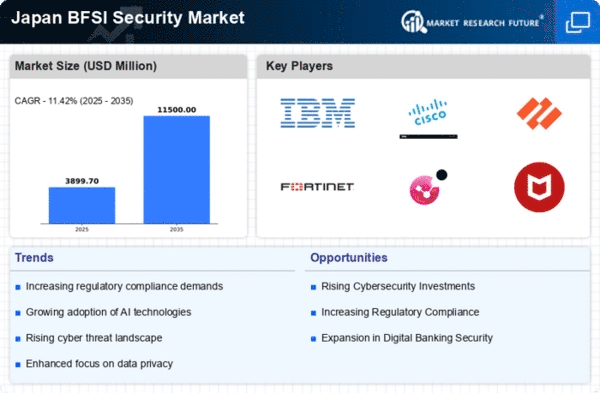Increasing Cyber Threats
The rise in cyber threats poses a substantial challenge to the bfsi security market. In Japan, financial institutions are increasingly targeted by sophisticated cyber attacks, leading to significant financial losses. Reports indicate that the cost of cybercrime in Japan reached approximately $1.5 billion in 2025, highlighting the urgent need for enhanced security measures. As a result, organizations are investing heavily in advanced security technologies, including intrusion detection systems and encryption solutions. This trend is likely to drive growth in the bfsi security market, as firms seek to protect sensitive customer data and maintain trust. Furthermore, the increasing frequency of data breaches has prompted regulatory bodies to enforce stricter security protocols, further fueling demand for robust security solutions in the financial sector.
Consumer Awareness and Expectations
Consumer awareness regarding data privacy and security is rising in Japan, significantly impacting the bfsi security market. As individuals become more informed about the risks associated with financial transactions, they are demanding higher levels of security from their financial service providers. Surveys indicate that approximately 80% of consumers prioritize security features when choosing a bank or financial institution. This shift in consumer expectations is prompting financial organizations to enhance their security measures, including implementing advanced fraud detection systems and transparent data handling practices. As a result, the bfsi security market is likely to experience growth driven by the need to meet these evolving consumer demands. Financial institutions that prioritize security and transparency may gain a competitive advantage in attracting and retaining customers.
Growing Demand for Digital Banking Services
The shift towards digital banking services is reshaping the bfsi security market in Japan. As more consumers opt for online banking, the need for secure digital platforms has become paramount. In 2025, it is estimated that over 70% of banking transactions in Japan will occur online, necessitating robust security measures to protect against potential threats. Financial institutions are increasingly adopting multi-factor authentication and end-to-end encryption to enhance the security of their digital services. This growing demand for secure digital banking solutions is likely to drive investments in the bfsi security market, as organizations strive to provide safe and reliable services to their customers. Furthermore, the competitive landscape is pushing banks to innovate and improve their security offerings, further fueling market growth.
Regulatory Landscape and Compliance Requirements
The regulatory landscape in Japan significantly influences the bfsi security market. Financial institutions are required to comply with stringent regulations aimed at safeguarding customer data and ensuring financial stability. The Financial Services Agency (FSA) has implemented various guidelines that mandate the adoption of robust security measures. Non-compliance can result in hefty fines, which can reach up to ¥100 million. Consequently, financial organizations are compelled to invest in comprehensive security frameworks to meet these regulatory demands. This compliance-driven approach is expected to propel the growth of the bfsi security market, as firms prioritize investments in security technologies and practices that align with regulatory expectations. The ongoing evolution of regulations will likely continue to shape the security strategies of financial institutions in Japan.
Technological Advancements in Security Solutions
Technological advancements are transforming the landscape of the bfsi security market in Japan. Innovations such as biometric authentication, blockchain technology, and advanced encryption methods are becoming integral to securing financial transactions. For instance, the adoption of biometric solutions is projected to grow by 25% annually, as institutions seek to enhance security while improving user experience. Additionally, the integration of artificial intelligence in fraud detection systems is expected to reduce false positives by up to 30%, thereby increasing operational efficiency. These advancements not only bolster security but also provide a competitive edge to financial institutions, making them more attractive to customers. As technology continues to evolve, the bfsi security market is likely to witness sustained growth driven by the demand for cutting-edge security solutions.
















